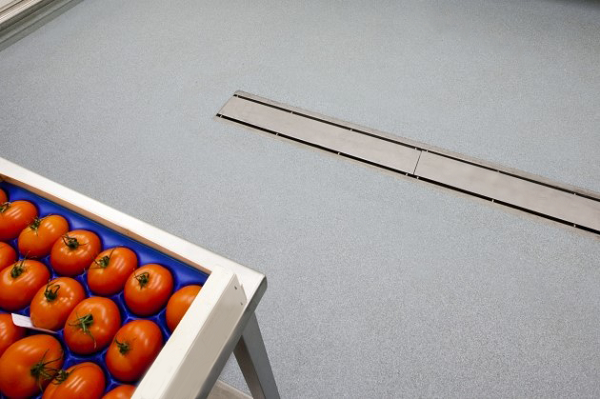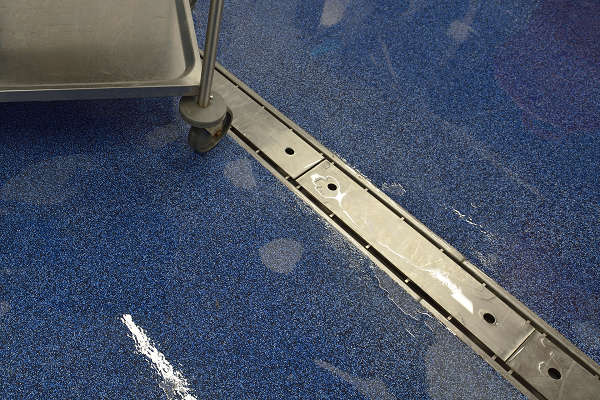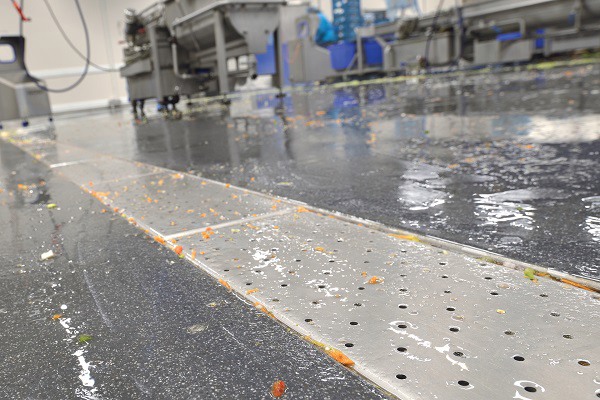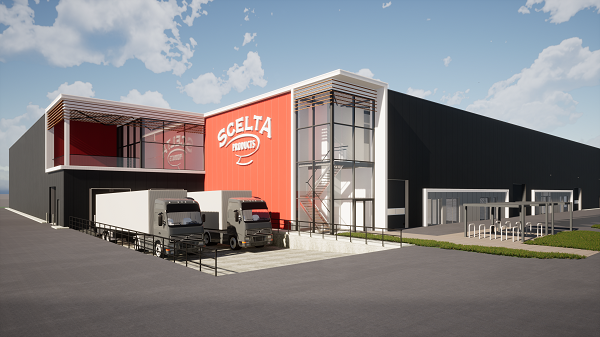"Many of us consider a floor a mere detail. Yet, an industrial floor - certainly one in a fruit and vegetable facility - is important for, say, hygiene," says Ton van Wijnen of Bolidt, a Dutch company that focuses on floors for fruit and vegetable companies. But technical aspects such as resistance to skidding, chemicals, high traffic, and hot liquids also contribute to the choice of a floor, as does the aesthetic element.
 An example of the integrated gutters in a wet fruit and vegetable process where sealant joints are avoided
An example of the integrated gutters in a wet fruit and vegetable process where sealant joints are avoided
Ton cites the floor in Scelta Products' new building as an example of how complicated choosing flooring for a fruit and vegetable processing facility can be. Scelta Products produces frozen vegetable snacks like breaded mushrooms, onion rings, and other products. "We're building a new 140,000m2 production plant," says Scelta Products' Wilco Boone.
"That will double our current capacity. The facility will be up and running in the last quarter of this year. The building must meet the BREAAM 2020 Outstanding requirements in terms of sustainability, which also sets requirements for the floor. This location will have state-of-the-art production lines and fully automated production processes."
"Every day, Scelta receives fresh raw materials, which are immediately washed and (wet) processed and then further processed in a subsequent (dry) step: coating and breadcrumbing. The products are then deep-fried, frozen, and packed before being shipped and transported to end-users," Wilco explains. "That means there's wet hot and cold, and dry, production steam," Ton says. "In all three of those phases, the floor - and preferably the same floor type - must meet safety requirements regarding skid resistance."

"It must be resistant to suddenly changing temperatures too. Hygiene is important in all phases. And in the frying phase, it must be able to handle possible accidental hot oil leaks. You use chemicals to deep clean the floor, so it must be able to withstand that as well. In the dry packaging phase, the floor must be able to handle transport equipment, such as forklifts and hand pallet trucks, and foot traffic. We can offer a floor that matches all the phases' requirements in terms of roughness and hygiene," says Ton.
He adds that the floor needs gutters and pits for the wet production phase. "That's a crucial detail. Those details determine everything, and so, too, the gutters. Instead of using sealant joints - which can easily come loose - our floors can seamlessly include stainless steel gutters. The floor is smooth against the stainless steel." Wilco says they considered both the floor's technical and aesthetic aspects. "Customers regularly visit the facility, so it must look its best."
Hygiene
For Scelta Products, which is BRC AA+ certified, hygiene is another critical aspect when it comes to choosing flooring, he says. Wilco points out that the Netherlands Standardization Institute standard requires floors that do not harbor bacteria and can be cleaned. Ton considers the cleaning aspect vital when choosing a floor. "Cleaning costs money, so it's one of the most important considerations during selection."

"In Scelta's case, with its wet production, the floor has to be cleaned daily. It makes a difference if you can do that in three hours versus five hours for a different floor." Bolidt supervises the floor cleaning process with a cleaning consultant who draws up a cleaning protocol. "That process can make or break a floor, so we pay close attention to cleaning."
"You must be able to clean industrial floors quickly and thoroughly. They, thus, cannot be porous. That's why we choose floors that are entirely sealed over their full thickness. Not so with many other floors where often only the top layer is sealed. If that is damaged, it can leak, which could cause mold to form in the floor. With a fully sealed floor, you don't have that problem."

Artist impression of the new Scelta processing plant
Timing and preparation
"There are so many factors involved, and each production process has different demands, so an industrial floor is a customized choice. We pay close attention to developing and advising on floors, but we also market and lay the floor ourselves. Bolidt does everything," says Ton. That's one of the factors Wilco factored into his consideration. "The schedule was well-communicated, and the process is flexible. Timing and preparation are critical to success on the job site," he concludes.
Ton van Wijnen twijnen@bolidt.nl
twijnen@bolidt.nl
Bolidt Kunststoftoepassing B.V.
Postbus 131
3340 AC Hendrik-Ido-Ambacht
T +31 (0)78 684 54 09
F +31 (0)78 684 54 00
E marcom@bolidt.nl
I www.bolidt.nl
 Wilco Boone
Wilco Boone
wboone@sceltaproducts.com
Scelta
+31 77 324 10 20
www.sceltamushrooms.com
sales@sceltamushrooms.com
